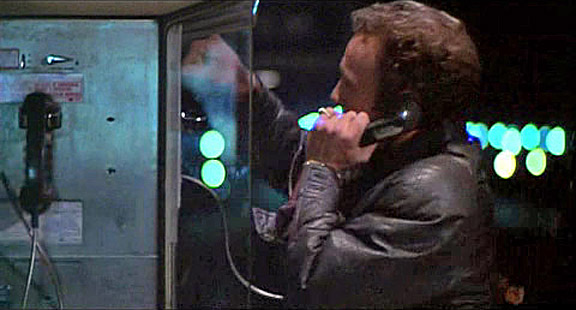Michael Mann’s Thief is a beauty to behold. It’s his feature film debut, but it already feels like the work of a confident, fully realized director and has many of his hallmarks already in place.
The only thing that truly marks it as an early work is that you can see Mann defining his terms, sketching out his moral universe: everything is just a little heightened, like this is a nation-defining epic. (I watched this with a friend who astutely commented that it feels like De Niro’s character in Heat may have heard this story and shaped his philosophies around it.) There’s a purity to James Caan’s Frank, who begins the film as both professional thief and a kind of innocent. He’s been hardened by prison, where his soul was stripped down to its essentials: he is what he wants and what he’s willing to do to get it. The theft–wonderfully shot, blue-collar, machinist-trade thieving, with the glorious shower of sparks you’ll ever see, some of the best sweat and grime, and one of cinema’s most well-deserved cigarettes–is what he’s willing to do. He’s good at it. He doesn’t indulge in unnecessary violence, and he always gets the job done.
It’s the half of his soul that’s all longing that brings the fundamental innocence into the picture. Frank has been through little but neglect and abuse, but it hasn’t made him cynical, not at heart. What he wants is a kind of apple-pie Americana he could never access before; he carries around a collage he made, a kind of folded-up vision board, and it’s more suburbia and stability than glitz and glamour. He wants a wife, a child, a good home. And while there’s a simplicity to his desires, he’s not actually unrealistic about them. His chosen partner is Jessie (Tuesday Weld), a woman whose past and level of brokenness is a match for his own, a woman he can be honest with and who can be honest with him. He accepts that she can’t have children; it’s fine, they’ll adopt. What he wants isn’t empty perfection, it’s the just fulfillment, the satisfaction of the roles and traditions that seem to come so easily to everyone else.
Mann then pits one half of Frank’s soul against the other. He makes Frank decide what’s more important to him: what he does or what he wants. The answer will make him who he is.
The instrument of Frank’s dilemma is Leo, played by Robert Prosky in a late-in-life debut that’s absolutely phenomenal. Prosky gives Leo just a hint of theatricality, barely enough to suggest that his salt-of-the-earth favorite-uncle chumminess might be a front for what is to follow. There’s no performance at all once Leo drops the pretense. Fuck all that “we’re a family now” bullshit–Leo is the boss and Frank is the employee: “You get paid what I say. You do what I say, I run you, there is no discussion. I want, you work, until you are burned-out, you are busted, or you’re dead.”
He’s right: there can’t be any discussion on this. There can only be what Frank does next. He’s been pure but paradoxical, and now the paradox has to resolve itself.
Thief is available streaming on HBOMax.


